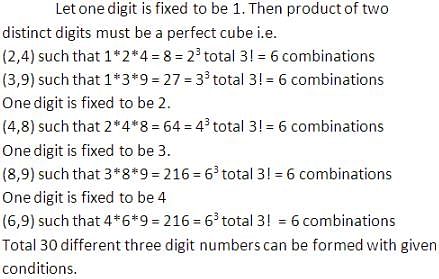Test: Permutation & Combination- 4 - CAT MCQ
15 Questions MCQ Test Quantitative Aptitude (Quant) - Test: Permutation & Combination- 4
Direction for questions 1 to 2 : Read passage below and solve the questions based on it.
Tn a horticultural show, a participant arranged a total of 1000 fruits of four types in a long straight line He first placed one apple, then two mangoes, three oranges, four custard apples, five apples, six mangoes, seven oranges, eight custard apples and so on (with apples followed by mangoes, oranges, custard apples in that order) uplo the 1000th fruit.
What was the 1000th fruit?
Tn a horticultural show, a participant arranged a total of 1000 fruits of four types in a long straight line He first placed one apple, then two mangoes, three oranges, four custard apples, five apples, six mangoes, seven oranges, eight custard apples and so on (with apples followed by mangoes, oranges, custard apples in that order) uplo the 1000th fruit.
Direction for questions 1 to 2: Read passage below and solve the questions based on it.
In a horticultural show, a participant arranged a total of 1000 fruits of four types in a long straight line He first placed one apple, then two mangoes, three oranges, four custard apples, five apples, six mangoes, seven oranges, eight custard apples and so on (with apples followed by mangoes, oranges, custard apples in that order) uplo the 1000th fruit.
Q.
What was the position of the 100th Mango?
In a horticultural show, a participant arranged a total of 1000 fruits of four types in a long straight line He first placed one apple, then two mangoes, three oranges, four custard apples, five apples, six mangoes, seven oranges, eight custard apples and so on (with apples followed by mangoes, oranges, custard apples in that order) uplo the 1000th fruit.
| 1 Crore+ students have signed up on EduRev. Have you? Download the App |
Consider S = (1, 2, 3,... 10). In how many ways two numbers from S can be selected so that the sum of the numbers selected is a double digit number?
Find the number of non-negative integer solutions to the system of equations a + b + c + d + e = 20 and a + b + c = 5 is
In a test of 10 multiple choice questions of one correct answer, each having 4 alternative answers, then the number of ways to put ticks at random for the answers to all the questions is
IfN be an element of the set A= {1,2,3,5,6,10,15,30} and P, Q and R are integers such that PQR = N, then the number of positive integral solutions of PQR = N, is
Number of ways in which n distinct things can be distributed among n persons so that atleast one person does not get anything is 232. Find n.
The number of employees in a nationalised bank in a small town is 10, out of which 4 are female and the rest male. A committee of 5 is to be formed. If m be the number of ways to form such a committee in which there is atleast one female employee and n be the number of ways to form such a committee whichincludes at least two male employees, then find the ratio m:n.
In how many ways 4 men and 4 women can be seated in a row so that men and women are alternate?
There were two women participating in a chess tournament. Every participant played two games with the other participates. The number of games that the men played among themselves proved to exceed by 66 number of games that the men played with the women. The number of participants is
A tea party is arranged for 16 people along the two sides of a long table with 8 chairs on each side. Four men wish to sit on one particular side and two on the other side. In how many ways can they be seated?
There are 12 intermediate stations between two places A and B. In how many ways can a train be made to stop at 4 of these 12 intermediate stations that no two stations are consecutive?
If the number of ways in which n different things can be distributed among n persons so that at least one person does not get any thing is 232 then what is the value of vfl
How many three-digit numbers with distinct digits can be formed such that the product of the digits is the cube of a positive integer?
In how many ways is it possible to choose a white square and a black square on a chessboard so that the squares must not lie in the same row or column?
|
196 videos|131 docs|110 tests
|
|
196 videos|131 docs|110 tests
|


















